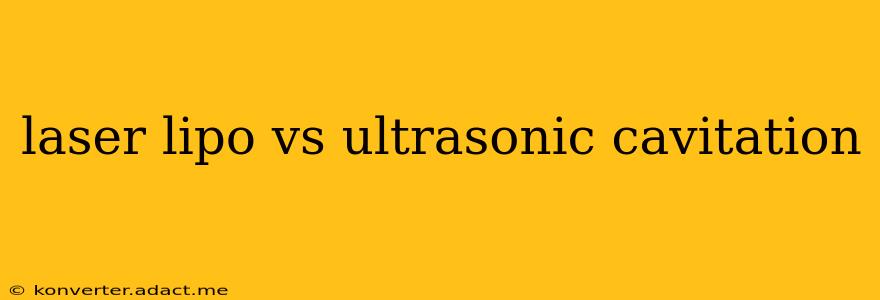Choosing between laser lipo and ultrasonic cavitation for body contouring can be confusing. Both promise to reduce fat and improve body shape, but they use different technologies and have different benefits and drawbacks. This comprehensive guide will delve into the specifics of each treatment, helping you make an informed decision.
What is Laser Lipo?
Laser lipolysis, often called laser lipo, is a minimally invasive procedure that uses laser energy to melt away fat cells. A small cannula (thin tube) is inserted through tiny incisions, and the laser energy breaks down the fat cells, which are then suctioned out. This isn't a weight-loss solution; it's targeted fat reduction for specific areas.
What is Ultrasonic Cavitation?
Ultrasonic cavitation is a non-invasive procedure that uses ultrasound waves to break down fat cells. The ultrasound energy creates cavitation bubbles within the fat cells, causing them to rupture and release their contents. These contents are then naturally processed and eliminated by the body's lymphatic system.
Laser Lipo vs. Ultrasonic Cavitation: Key Differences
| Feature | Laser Lipo | Ultrasonic Cavitation |
|---|---|---|
| Invasiveness | Minimally invasive (requires small incisions) | Non-invasive (no incisions) |
| Treatment Time | Longer, typically 1-3 hours | Shorter, typically 30-60 minutes per session |
| Downtime | Some bruising and swelling, several days recovery | Minimal to no downtime |
| Results | More dramatic and immediate results | Gradual results over multiple sessions |
| Cost | Generally more expensive | Generally less expensive |
| Fat Removal | Directly removes fat cells | Breaks down fat cells, relies on lymphatic system |
How Much Does Laser Lipo Cost?
The cost of laser lipo varies widely depending on the area treated, the amount of fat removed, and the geographic location. It's best to consult with a qualified plastic surgeon or dermatologist for a personalized quote.
How Much Does Ultrasonic Cavitation Cost?
Similar to laser lipo, the cost of ultrasonic cavitation varies based on the number of sessions needed and the area treated. Multiple sessions are usually required to see noticeable results.
Is Ultrasonic Cavitation Painful?
Ultrasonic cavitation is generally considered painless. Some patients report a mild warming sensation during the treatment.
Does Laser Lipo Hurt?
Laser lipo is a minimally invasive procedure, and while local anesthesia is used, some discomfort is possible. Pain levels vary from person to person. Post-procedure discomfort can include bruising, swelling, and tenderness.
Is Laser Lipo Safe?
Laser lipo, when performed by a qualified and experienced professional, is generally considered safe. However, as with any medical procedure, there are potential risks and complications such as infection, scarring, and nerve damage.
Is Ultrasonic Cavitation Safe?
Ultrasonic cavitation is generally considered safe when performed correctly by a qualified professional. However, it's crucial to choose a reputable clinic with experienced technicians. Potential side effects can include temporary skin redness and bruising.
What are the Side Effects of Laser Lipo?
Potential side effects of laser lipo include bruising, swelling, pain, infection, numbness or tingling, and uneven skin texture.
What are the Side Effects of Ultrasonic Cavitation?
Potential side effects of ultrasonic cavitation include skin redness, bruising, mild discomfort, and temporary skin sensitivity. In rare cases, burns can occur if the treatment isn't performed correctly.
Which Treatment is Right for Me?
The best treatment for you depends on several factors, including your individual needs, goals, budget, and health status. A consultation with a qualified medical professional is crucial to determine which procedure is most appropriate. Consider factors like the amount of fat you wish to remove, your tolerance for downtime, and your budget.
Disclaimer: This information is for educational purposes only and does not constitute medical advice. Always consult with a qualified healthcare professional before undergoing any medical procedure.
